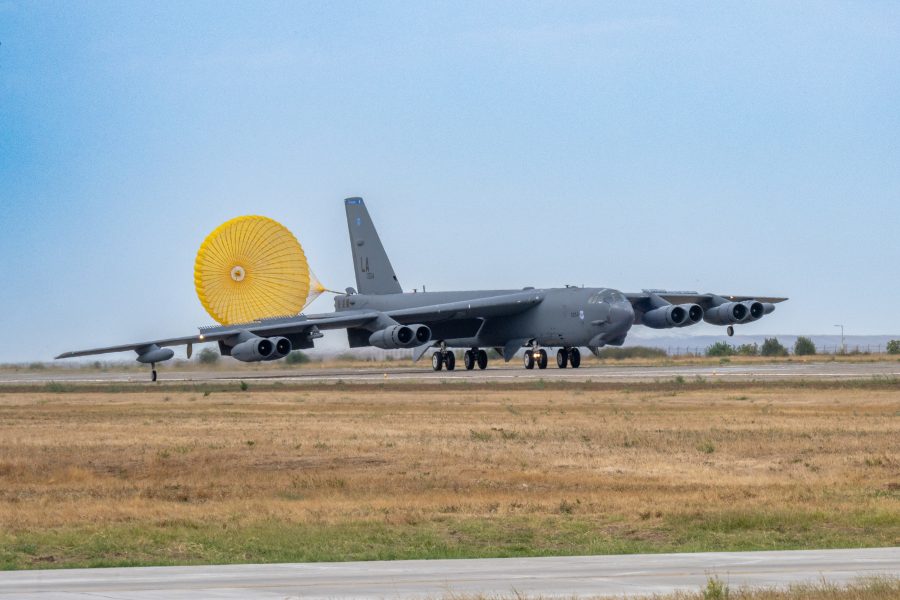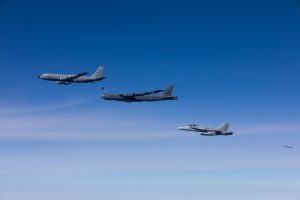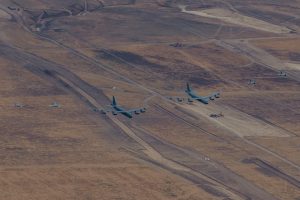Two B-52 Stratofortresses flew through Finnish airspace for the first time ever over the weekend, before landing in Romania to start the first ever operational deployment of the aircraft from that country.
The strategic bombers, from Barksdale Air Force Base, La., flew across Norway before flying over Lapland, Finland’s northernmost region that borders Russia, Sweden, and Norway. Russia, which shares more than 800 miles of border with Finland, took note.
While flying in formation with NATO allies’ fighters, the B-52s were intercepted by two Russian aircraft over the Barents Sea in the Arctic on July 21, U.S. Air Forces in Europe (USAFE) said in a statement. The Russian Ministry of Defense said it scrambled its MiG-29 and MiG-31 fighters to intercept the bombers approaching the Russian border over the Barents Sea.
However, unlike previous incidents involving U.S. drones and manned aircraft over the Black Sea and Syria, the Russians did not behave recklessly during their intercept of the B-52s in USAFE, two U.S. officials told Air & Space Forces Magazine.
“The intercept was deemed safe and professional,” a command official said.
Russian intercepts of American and allied aircraft since Moscow’s February 2022 full-scale invasion of Ukraine have turned risky at times. Intercepts of aircraft are not inherently objectionable to the U.S., which conducts its own intercepts of Russian warplanes flying near Alaska in international airspace several times per year. Russian bombers are also sometimes intercepted in international airspace in Northern Europe by NATO jets that sit on alert.
But in March 2023, a Russian fighter clipped a USAF MQ-9 propeller while intercepting the drone over the Black Sea, causing the operator to crash the uncontrollable aircraft into the water. Over the summer, Russian warplanes routinely harassed American manned and unmanned aircraft over Syria in incidents U.S. officials said sometimes “put lives at risk.”
In the July 21 incident, the Air Force said in a release that the bombers were flying “in accordance with international law,” which Moscow did not dispute.
“The crews of the Russian fighters identified the aerial target as a pair of U.S. Air Force B-52H strategic bombers,” the Russian Defense Ministry wrote on Telegram. “As the Russian fighters approached, the U.S. strategic bombers turned away from the State Border of the Russian Federation.”
The bombers from Barksdale’s 20th Bomb Squadron touched down at Mihail Kogalniceanu Airbase, Romania, afterward, where they are currently operating as part of Bomber Task Force 24-4.
The mission saw the two bombers integrate with numerous NATO fighters. Two Finnish F/A-18 Hornets, two German Eurofighter Typhoons, two Polish F-16s, two Hungarian JAS-39 Gripens, and two Romanian F-16s escorted the bombers on their journey. The operation was also supported by U.S. refueling aircraft, including one KC-46 and two KC-135s from the 100th Air Refueling Wing, a USAF unit based at RAF Mildenhall, United Kingdom.
“In today’s global environment, it is vital that we be postured to deliver a range of sustainable capability from great distances,” Gen. James Hecker, the head of USAFE and NATO Allied Air Command, said in a statement. “This iteration of Bomber Task Force offers an excellent opportunity to refine our agile combat employment tactics, techniques, and procedures.”
Finland’s Defense Minister Antti Häkkänen posted to social media confirming the cooperation with the long-range bombers in Finnish territory, saying that it was “a normal cooperation carried out in the territory of a NATO member country and it demonstrate the basic pillar of common defense and deterrence.”
The U.S. will soon preposition aircraft and vessels in Finland following the signing of a bilateral Defense Cooperation Agreement between Häkkänen and U.S. Secretary of State Antony Blinken in December. While specific details regarding the types of U.S. assets to be stationed in Finland have not been disclosed, Washington is expected to deploy its assets and forces across various designated military facilities in Finland for future training and exercises, as outlined in the agreement.
The presence of the B-52s in Finnish airspace and in Romania comes in the wake of NATO announcing plans to bolster defense and cooperation for its Eastern Flank region.
An initiative outlined in the Washington Summit Declaration includes plans to establish a NATO presence in Finland, and fully integrate the nation into NATO plans, forces, and command structures to leverage their capabilities.
“The U.S. is dedicated to work alongside our NATO Allies and partners along the Eastern Flank to ensure we have the combined skills and coordination capabilities necessary to maintain regional safety, security, and stability,” said Hecker.
Editor’s Note: This article was updated on July 23 with additional details.



